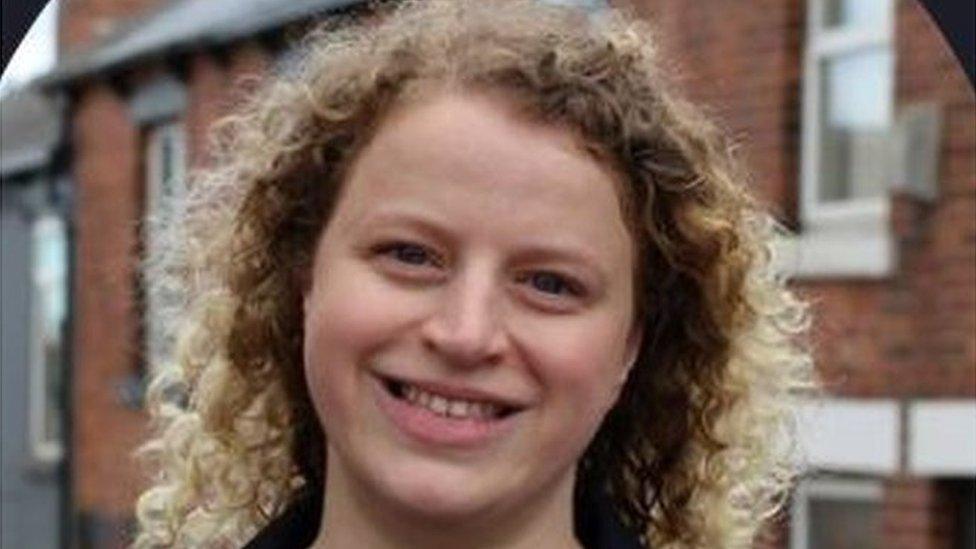Sheffield city council referendum: What's it all about?
- Published
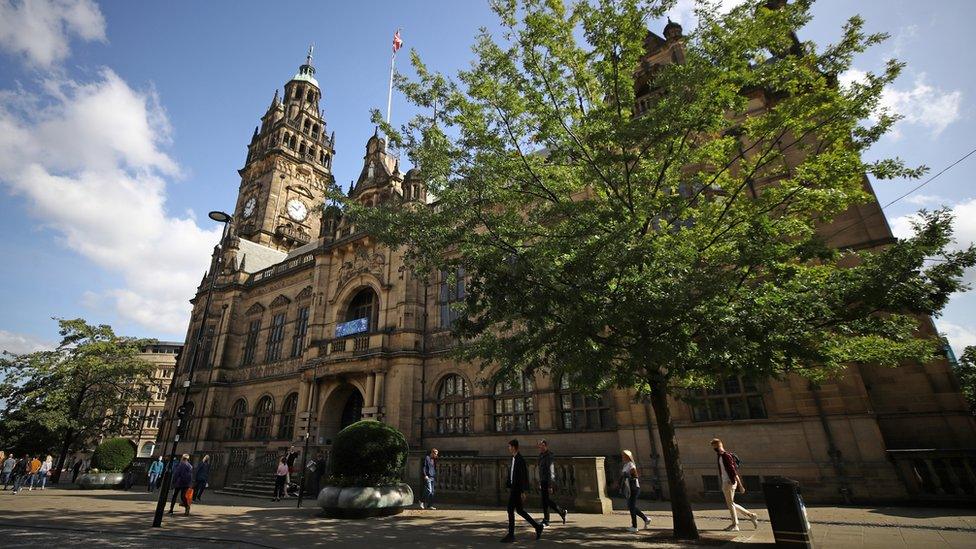
Sheffield City Council is run by the leader and nine cabinet members
As well as voting for their local councillors and Police and Crime Commissioner on 6 May people in Sheffield will be asked to decide how their council is run in future.
But what are the options on the table and what do they mean?
What is the referendum about?
Voters are being given a choice between the existing cabinet model or a committee system.
The referendum was triggered by campaign group It's Our City, which favours the committee system, after it gathered a petition signed by more than 5% of Sheffield's voters.
Whatever the outcome, the result is legally binding and another referendum cannot be held for nine years.

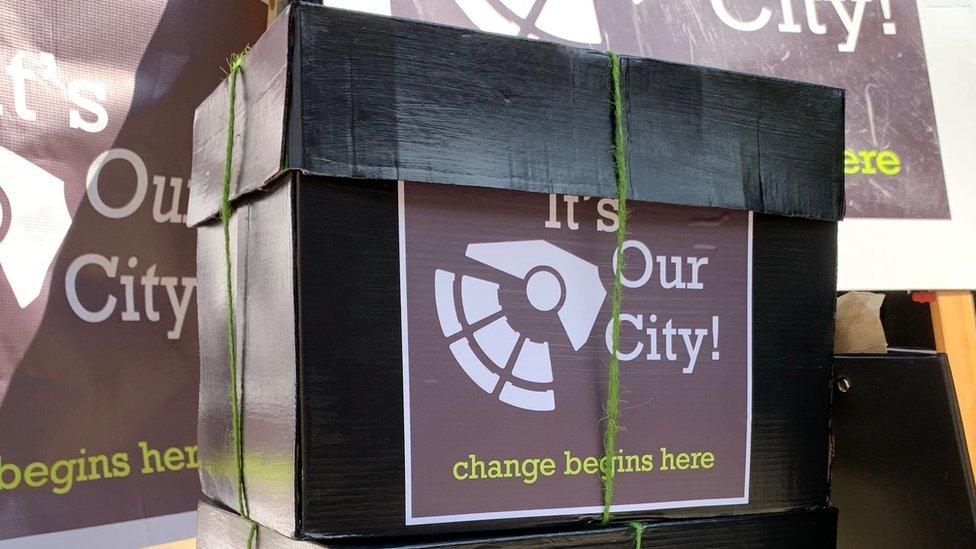
More than 26,000 people signed a petition calling for a referendum
How does the cabinet model work?
Under the existing model the council - consisting of 84 councillors - is run by a leader who appoints nine cabinet members.
Each cabinet member has a specific area of responsibility, or portfolio, such as children's services or transport.
These 10 councillors form the executive and have responsibility for decision-making.
A cross-party committee can call in decisions for scrutiny but the cabinet does not have to accept their recommendations.
Some issues such as the budget, have to be decided and voted on by the whole council.

How does the committee system work?
Under a committee system, decision-making responsibilities are shared between more councillors.
Rather than a single cabinet member, a committee of several elected members makes decisions for a specific portfolio.
Committees are made up of councillors from all parties, with the number of seats proportionate to the political make-up of the council.
The exact structure of any committee system for Sheffield would be drawn up if voters back the change.

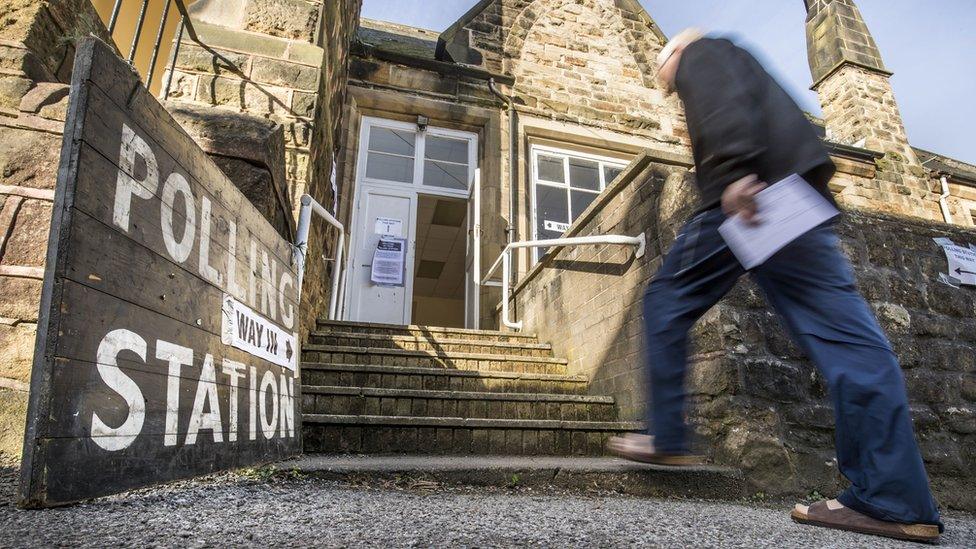
Voters will be asked to choose between a cabinet or committee model
What are the arguments for and against the models?
Cabinet-run councils were brought in under the Local Government Act 2000, external to reflect the way decisions were made at a national level.
Colin Copus, a professor of local politics and a member of the Local Governance Research Centre at De Montfort University, said the idea was to "speed up decision-making and make it very clear who was responsible".
He said the committee system, which had existed in local government previously, was seen as "opaque, cumbersome, slow and unaccountable".
As committees reflect the council's political make-up, he said, the ruling party would also have the majority on each committee.
Dr Simon Duffy, from Sheffield-based think tank the Centre for Welfare Reform, said the cabinet system was not the best way to represent a city of 600,000 people.
While Labour retained control of decision-making in Sheffield in 2019, he said, the party received less than a third of votes cast.
As a result, the existing system "does not feel right or democratic" and it was "bizarre" for 10 people to make decisions on behalf of the city, he said.
Moving to a "modern committee system" would be a "much more inclusive way" of organising the city, he said.
Returning to such a system was "not going back to the 1970s" but was "like opening a door to a new set of possibilities", he added.


Counting for the referendum will take place on 10 May
What do the parties have to say?
Council leader Labour's Bob Johnson said the city was better off under the existing model and he would vote against a change.
"I think we've got bigger issues in front of us coming out of lockdown," he said.
"I do not believe a different type of town hall meeting is going to help engage people."
He said he believed the strong leadership model provided accountability in a way the committee system did not.
Representatives of the Conservatives, Greens and Liberal Democrats, however, back a move to the committee system.
Ian Walker, vice chair of South Yorkshire Conservatives, said it would increase scrutiny and open up the decision-making process.
"Having a committee structure will mean we have good people from other parties, which are not in the majority on the council, bringing a fresh pair of eyes on decisions that are emerging so that we can get better decisions made," he said.
Douglas Johnson, leader of the Greens, said he believed the committee system was "fundamentally better" and allowed for more accountability as each member of a committee would have their vote recorded.
Liberal Democrat leader Shaffaq Mohammed said limiting decision-making powers to 10 councillors had "disenfranchised huge swathes of the city who feel left out and without a voice".

Has anyone else made the change?
The Local Government Act 2000 required all principal councils to adopt a strong leader or cabinet model.
However, after the Localism Act 2011 was passed the position changed and councils were once again allowed to operate a committee system.
Since then a number of councils have reverted to a committee system, including Reading Council, Brighton and Hove Council and Wirral Council.

When will we know the result and when would any change come into effect?
Counting in referendum will not begin until Monday 10 May.
If the result is in favour of altering the system Sheffield City Council says any changes will be "implemented with effect from the 2022 Annual Meeting".

Follow BBC Yorkshire on Facebook, external, Twitter, external and Instagram, external. Send your story ideas to yorkslincs.news@bbc.co.uk, external.
Related topics
- Published23 September 2019
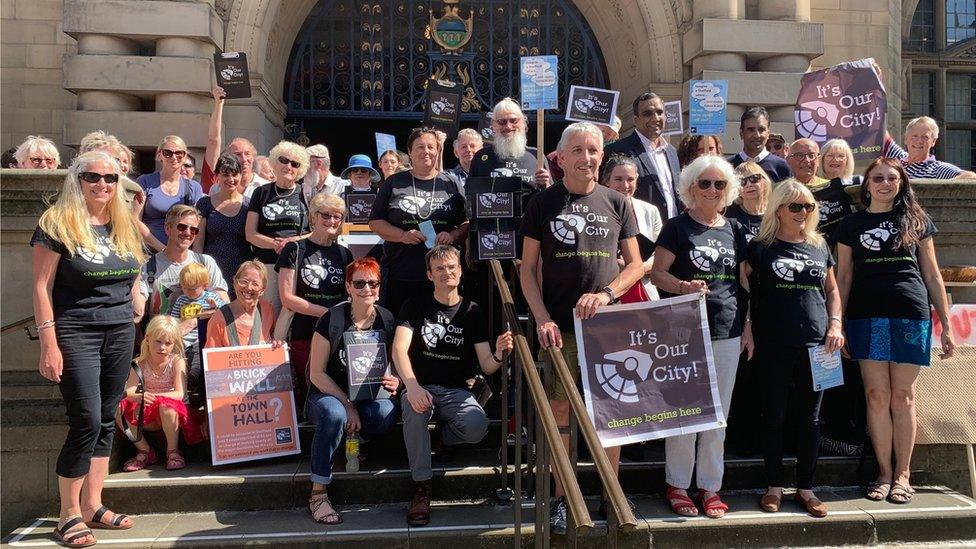
- Published23 August 2019
